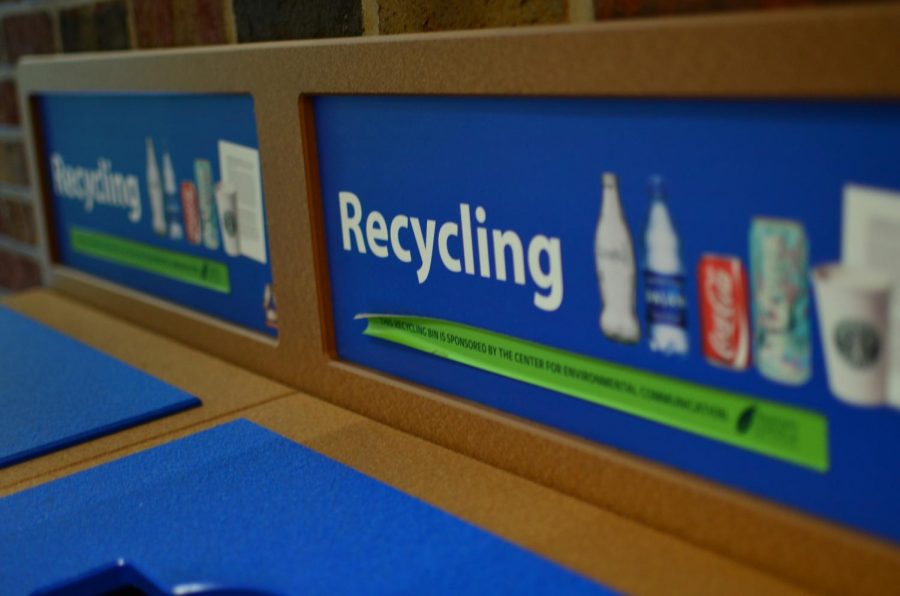Loyola resumes recycling after year-long hiatus
Recycling bins sit outside the Danna Center on Loyola’s campus. With Loyola’s renewed recycling initiative, Loyola students will once again be able to recycle plastics. Photo credit: Gabrielle Korein
April 7, 2021
Editor’s Note: This story was changed to reflect that most, not all, campus recycling was being sent to the landfill by former recycling provider Republic Services Inc., for a year. A previous version of this story incorrectly stated that all campus recycling was being sent to a landfill. This story was updated on April 8, at 7:30 p.m.
After a year of most on-campus recycling being sent to the landfill, Loyola will resume recycling with the waste service company Waste Connections.
“Everything we put in those bins will be recycled just like it used to be,” Robert Thomas, chair of the sustainability committee and director of the Center for Environmental Communications said.
Last March, Loyola was told its single-stream recycling program, a program that allows different types of recyclables to be collected into bin, was suspended by its waste management company of seven years, Republic Services Inc., according to Marshall. However, he said that during that one year period some recyclables such as corrugated paper, which is typically used in cardboard, may have been continued to be recycled by their former recycling provider.
The company had suspended its single-stream recycling program due to a weak market, according to Marshall.
“At that time, we could find no other provider to take our recycling,” Marshall said.
Thomas said that the university was “left hanging” by its former recycling company’s decision and stopped recycling for a year.
Then, Loyola discovered that Waste Connections, the university’s new contractor, had started single stream recycling, prompting the switch, according to Physical Plant Director Charles Marshall.
While the new recycler will be more expensive, it is the university’s only option with sustainability as “the bottom line,” Marshall said.
“Recycling reduces waste and saves natural resources. Even though it is a cost to the university,” Marshall said. “It is the right thing to do for the environment.”
The weak market that had prompted the end of Loyola’s old recycling program came as a result of sources such as China no longer purchasing the United States recyclable materials, according to Thomas.
In 2018, China’s National Sword Policy banned the import of many recyclable materials that would have been processed in the country’s recycling facilities, according to a report from the Yale School of the Environment.
The Chinese government said they enacted the ban because of the labor intensiveness of processing post consumer scrap and its contamination coming from abroad, said Joshua L. Goldstein, professor of modern Chinese history.
But Goldstein said that the Chinese government’s response limits the full truth. According to Goldstein, China enacted the ban to move recycling to government control which he said would be in the country’s best interest.
“They can make more money not just off of the recycling itself, but off of the entire waste management infrastructure structure and have it under their control,” Goldstein said.
Soon after China closed its ports to “foreign trash,” Goldstein said other Southeast Asian countries followed.
Across the country cities with single-stream systems were continuing to accept residents recycled goods in the absence of a market, Goldstein said.
In parts of New Orleans and Jefferson Parish, Republic Services halted its collection of residential recycling in 2019 as a result of the ban which caused local governments to scramble to find alternatives, according to reporting from Nola.com.
The ban has not only effected New Orleans, but has a national impact with 100 curbside recycling programs ending or being paused across the United States since 2018 , according to data from Waste Dive, a website focused on news regarding waste and recycling.
“There’s been a great deal less plastic that’s getting recycled,” Goldstein said. “Paper has had its difficulties as well.”
However, Goldstein said the recycling crisis serves as a wake up call for the United States.
“There’s a reason why its’ reduce, reuse and recycle’ as the order that you go in,” Goldstein said. “But recycle is a terrible last option in most cases or certainly in the case of plastic.”
Goldstein referred to recycling as an “utopian dream” that is unattainable.
“What we generally want from our waste management companies is to make our waste go away,” Goldstein said. “But that magic has never existed and certainly has never existed for plastics.”
While 1% of plastic bags are recycled every year, the lifespan of a bag averages at approximately 12 minutes, according to the 5 Gryes Institute, a non-profit focused on reducing plastics’ pollution.
Going forward, Goldstein said that the focus should be on limiting waste creation rather than waste management companies.
“We need to recognize where the problem really lies,” Goldstein said. “The problem lies in the production of plastics in our systems that are so dependent on single use or minimal uses.”








